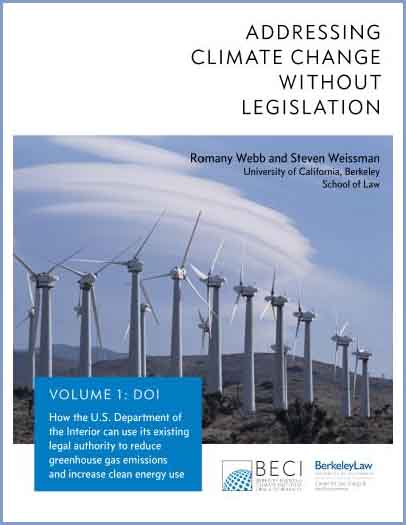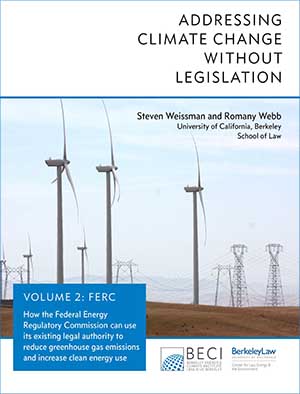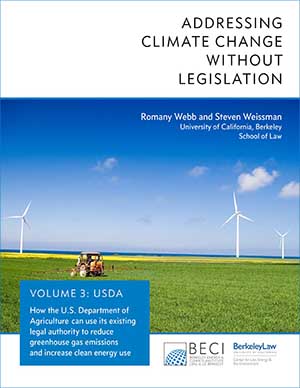This three volume series of reports analyzes steps that federal agencies can take to mitigate climate change under existing laws. A collaboration between CLEE and the Berkeley Energy and Climate Institute, this series details how the Department of the Interior (DOI), Federal Energy Regulation Commission (FERC), and the U.S. Department of Agriculture (USDA) can use their legal authority to reduce greenhouse gas emissions and expand clean energy use across the country.
Volume 1: Department of the Interior
The Department of the Interior (DOI) is one of several executive agencies charged with implementing the President’s Climate Action Plan. The DOI manages approximately 500 million acres of land in the U.S. and a further 1.7 billion acres off its shores. This report identifies actions the DOI can take, on the basis of its current legal authority, to mitigate climate change. The report provides a survey of actions that can be taken under existing law, without the need for approval by Congress. The identified actions each result in reduced greenhouse gas emissions and/or increased carbon sequestration. However, beyond this finding of climate benefits, the report does not assess the merits of each action. Rather, it is left up to the DOI to determine whether implementation of each action is a wise policy choice.
Volume 2: Federal Energy Regulation Commission
FERC is an independent federal agency responsible for regulating aspects of the electricity, hydropower, natural gas, and oil industries. These industries are among the largest emitters of greenhouse gases nationally. This report discusses further actions FERC can take to reduce the energy sector’s greenhouse gas emissions. The report identifies actions that can be taken under existing law, without the need for approval by Congress. However, the report does not assess the merits of the identified actions. Rather, it is left up to FERC to determine whether implementation of each action is a wise policy choice.
Volume 3: US Department of Agriculture
The agricultural industry is currently the fifth largest source of greenhouse gases in the U.S., contributing over eight percent of national emissions in 2012. s the federal agency overseeing the agricultural and forestry sectors, the U.S. Department of Agriculture can play an important role in mitigating climate change. The Department has already acted to reduce greenhouse gas emissions from agricultural activities and increase carbon sequestration on agricultural lands. However, its work is far from complete. This report identifies additional actions the Department can take, under existing law, to reduce emissions and increase sequestration.


